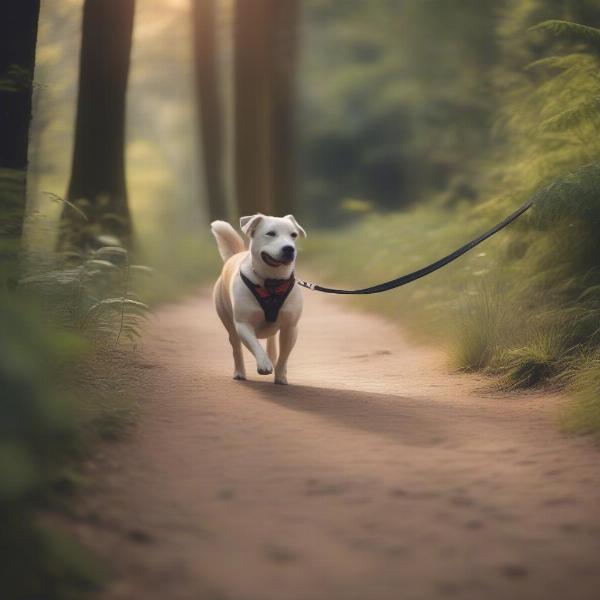The Buddha Dog isn’t a specific breed, but rather a term referring to dogs that embody a calm, peaceful, and mindful demeanor, reminiscent of the Buddha himself. This can manifest in various breeds, from the serene Tibetan Spaniel to the gentle giant Great Dane. While any dog, with proper training and care, can achieve this tranquil state, certain breeds are naturally predisposed to such a temperament. This guide will delve into what constitutes a “Buddha Dog,” the characteristics to look for, and how to nurture that inner peace in your canine companion.
Understanding the “Buddha Dog” Philosophy
What truly defines a Buddha Dog? It’s not about physical appearance but a state of being. Think of a dog that radiates tranquility, accepts the present moment with a wagging tail, and approaches life with gentle acceptance. These dogs are often highly adaptable, exhibiting low reactivity and a deep capacity for connection. They are the masters of mindfulness, finding joy in the simple pleasures of a belly rub or a quiet moment in the sun.
Choosing a Potential “Buddha Dog”
While any dog can learn the ways of zen, some breeds naturally embody a calmer demeanor. Breeds like the Cavalier King Charles Spaniel, the French Bulldog, and the Greyhound are often known for their laid-back personalities. Researching breed temperaments is crucial when seeking a potential Buddha Dog. However, individual personalities within breeds can vary greatly. Spending time with a dog before bringing them home is essential to gauge their temperament and energy levels.
Cultivating Inner Peace: Training and Environment
Nurturing a Buddha Dog requires creating a supportive and enriching environment. Positive reinforcement training methods are key. Focus on rewarding calm behavior and redirecting unwanted actions with gentleness and patience. Consistency is paramount. A predictable routine can significantly reduce anxiety and promote a sense of security. Enrichment activities like puzzle toys and scent work can engage their minds and further foster a sense of contentment.
Diet and Exercise for a Balanced Buddha Dog
A healthy diet plays a vital role in a dog’s overall well-being and can influence their temperament. Consult with your veterinarian to determine the best food for your dog’s specific needs. Regular exercise is equally important, even for the most zen of canines. Daily walks, playtime, and mental stimulation can help release pent-up energy and promote relaxation.  A dog enjoying a peaceful walk in nature
A dog enjoying a peaceful walk in nature
Living with a Buddha Dog
The rewards of sharing your life with a Buddha Dog are immeasurable. Their calm presence can be a source of comfort and joy. They remind us to slow down, appreciate the small things, and find peace in the present moment. While the journey to achieving Buddha-like serenity may vary from dog to dog, the principles of patience, consistency, and positive reinforcement remain constant.
Conclusion
The Buddha Dog is more than just a label; it’s a philosophy of canine companionship rooted in peace, mindfulness, and gentle acceptance. While certain breeds may be naturally predisposed to this tranquil state, any dog can learn to embody the spirit of the Buddha with the right guidance and environment. By focusing on positive reinforcement training, providing a balanced diet and regular exercise, and creating a calm and enriching environment, you can nurture your dog’s inner peace and enjoy the immeasurable rewards of a truly harmonious relationship.
FAQ
- Are Buddha Dogs always quiet? Not necessarily. While they tend to be less reactive and vocal than some breeds, they can still enjoy playful moments and express themselves when needed.
- Is there a specific breed called the “Buddha Dog”? No, it’s a descriptive term referring to a dog’s temperament and demeanor.
- How can I tell if my dog is a Buddha Dog? Look for signs of calmness, adaptability, low reactivity, and a deep capacity for connection.
- Can any dog become a Buddha Dog? With the right training and environment, any dog can cultivate a more peaceful and mindful demeanor.
- What are the best training methods for a Buddha Dog? Positive reinforcement methods are most effective, focusing on rewarding desired behaviors.
- What are some good enrichment activities for a Buddha Dog? Puzzle toys, scent work, and gentle walks in nature are excellent choices.
- What is the most important thing to remember when raising a Buddha Dog? Patience, consistency, and a loving environment are key.
ILM Dog is your trusted international resource for expert dog care and nurturing advice. We offer comprehensive guidance on various aspects of dog ownership, from breed selection and health care to training and nutrition. Our mission is to empower dog owners worldwide with the knowledge and resources they need to provide their furry companions with the best possible care. Whether you’re a seasoned dog owner or just starting your journey, ILM Dog is here to support you every step of the way. Contact us at [email protected] or +44 20-3965-8624 for personalized guidance.